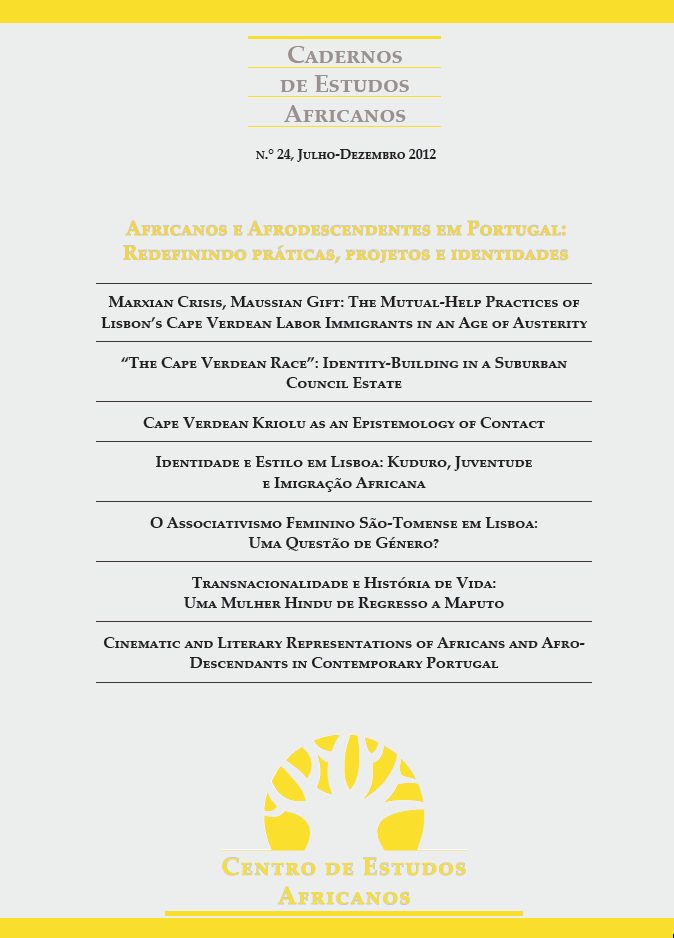Cape Verdean Kriolu as an Epistemology of Contact
DOI:
https://doi.org/10.4000/cea.696Keywords:
Cape Verde, Lisbon, Creole, chronotope, space, rapAbstract
Kriolu as language and sentiment represents a “contact perspective”, an outlook on life and medium of identification historically structured by the encounter. Cape Verde was born out of an early creole formation and movement is an essential part of Cape Verdean practices of language and identity. Most recently, the Portuguese state and third-party real estate developers have provided another scenario in the long series of (dis)emplacement dramas for Cape Verdeans as Lisbon administrations have pushed to demolish “improvised” housing and regroup people into “social” neighborhoods. I argue that neighborhoods such as Casal da Boba are not simply “contact zones” where differences are made manifest and subaltern agency is potentially given a stage. In the case of Cape Verdean Kriolu in Lisbon, the concept of “contact” is an epistemological one. This essay connects the empirical realities of Lisbon neighborhoods to the historically structured experiences of contact vis-à-vis colonialism, migration and language.References
Bennett, A. (2000). Popular music and youth culture: Music, identity and place. London: MacMillan Press.
Bourgois, P. (2003). In search of respect: Selling crack in El Barrio (2nd edition). New York: Cambridge University Press.
Cardoso, A., & Perista, H. (1994). A cidade esquecida: Pobreza em bairros degradados de Lisboa. Sociologia - Problemas e Práticas, 15, pp. 99-111.
Carter, K., & Aulette, J. (2009). Cape Verdean women and globalization: The politics of gender, culture, and resistance. New York: Palgrave Macmillan.
Connell, J., & Gibson, C. (2003). Sound tracks: Popular music, identity, and place. London: Routledge.
Duarte, D. A. (2003). Bilinguismo ou diglossia? As relações de força entre o crioulo e o português na sociedade cabo-verdiana. Praia: Spleen.
Eaton, Martin (1993). Foreign residents and illegal aliens: Os negros em Portugal. Ethnic and Racial Studies, 16 (3), 536-562.
Errante, A. (1998). Education and national personae in Portugal’s colonial and postcolonial transition. Comparative Education Review, 42 (3), 267-308.
DOI : 10.1086/447509
Forman, M. (2004). Represent: Race, space, and place in rap music. In Forman, M., & Neal, M. A. (Eds.), That’s the joint: The hip-hop studies reader (pp. 201-222). New York: Routledge.
DOI : 10.1017/S0261143000000015
Freyre, G. (1953). Aventura e rotina: Sugestões de uma viagem à procura das constantes portuguesas de caráter e ação. Rio de Janeiro: Livraria José Olympio.
Genova, N. (2010). The deportation regime: Sovereignty, space and the freedom of movement. In Genova, N., & Peutz, N. (Eds.), The deportation regime (pp. 33-65). Durham: Duke University Press.
Gilroy, P. (1993). The Black Atlantic: Modernity and double consciousness. Cambridge: Harvard University Press.
Heywood, L., & Thornton, J. (2007). Central Africans, Atlantic creoles, and the foundation of the Americas, 1585-1660. New York: Cambridge University Press.
Horta, A. P. (2001). Transnational networks and the local politics of migrant grassroots organizing in postcolonial Portugal. ESRC Research Programme, WPTC-02-03. University of Oxford.
Horta, A. P. (2008). A construção da alteridade: Nacionalidade, políticas de imigração e acção colectiva migrante na sociedade portuguesa pós-colonial. Lisbon: Fundação Calouste Gulbenkian.
Huttman, E., Saltman, J., & Blauw, W. (Eds.) (1991). Urban housing segregation of minorities in Western Europe and the United States. Durham: Duke University Press.
Karakayali, S., & Rigo, E. (2010). Mapping the European space of circulation. In Genova, N., & Peutz, N. (Eds.), The deportation regime (pp. 123-144). Durham: Duke University Press.
DOI : 10.1215/9780822391340-005
Krims, A. (2007). Music and urban geography. New York: Routledge.
Léonard, Y. (1999). A ideia colonial, olhares cruzados (1890-1930). In Bethencourt, F., & Chaudhuri, K. (Eds.), História da expansão portuguesa (4th edition) (pp. 536-550). Lisbon: Círculo de Leitores.
Lobban, R., & Halter, M. (1988). Historical dictionary of the Republic of Cape Verde (2nd edition). Metuchen, New Jersey: Scarecrow Press.
Märzhäuser, C. (2010). Cape Verdean Creole in Lisbon – Young generations’ perspective. Trans-Internet. Journal for Cultural Studies, 17 (Accessed on March 10, 2012, from http://inst.at/trans/17Nr/1-3/1-3_maerzhaeuser17.htm).
Pennycook, A. (2010). Language as a local practice. New York: Routledge.
Pereira, N. T. (1994). Pátios e vilas de Lisboa, 1870-1930: A promoção privada de alojamento operário. Análise Social, XXIX (127), 509-524.
Perl, M. (1982). Acerca de alguns aspectos históricos do português crioulo em África. Biblios, 58, pp. 1-12.
Perry, I. (2004). Prophets in the hood: Politics and poetics in hip-hop. Durham: Duke University Press.
Pratt, M. L. (1987). Linguistic utopias. In Fabb, N., Attridge, D., Durant, A., & MacCabe, C. (Eds.), The linguistics of writing (pp. 48-66). Manchester University Press.
Pratt, M. L. (1991). Arts of the contact zone. Profession, 91, pp. 33-40.
Pratt, M. L. (1992). Imperial eyes: Travel writing and transculturation. New York: Routledge.
Shank, B. (1994). Dissonant identities: The rock’n’ roll scene in Austin, Texas. Middletown, Connecticut: Wesleyan University Press.
Straw, W. (1991). Systems of articulation, logics of change: Scenes and communities in popular music. Cultural Studies, 5 (3), 368-388.
DOI : 10.1080/09502389100490311
Suárez-Navaz, L. (2004). Rebordering the Mediterranean: Boundaries and citizenship in Southern Europe. New York: Berghahn Books.
Weiss, B. (2002). Thug realism: Inhabiting fantasy in urban Tanzania. Cultural Anthropology, 17 (1), 93-124.
DOI : 10.1525/can.2002.17.1.93
Downloads
Published
Issue
Section
License
Copyright (c) 2016 Cadernos de Estudos Africanos

This work is licensed under a Creative Commons Attribution-NonCommercial-ShareAlike 4.0 International License.
I authorize the publication of the submitted article/review of which I am the author.
I also declare that this article is original, that it has not been published in any other way, and that I exclusively assign the publication rights to the journal Cadernos de Estudos Africanos. Reproduction of the article, in whole or in part, in other publications or on other media is subject to the prior authorization of the publisher Centro de Estudos Internacionais do Iscte - Instituto Universitário de Lisboa.

